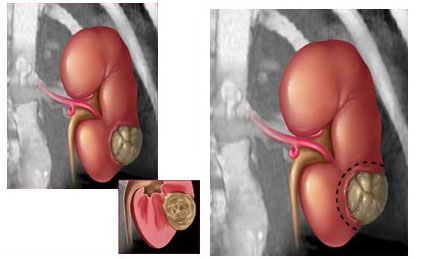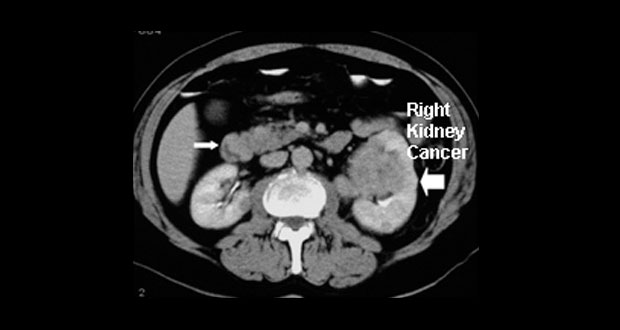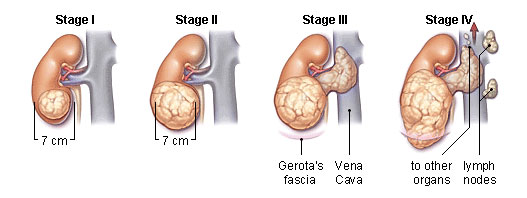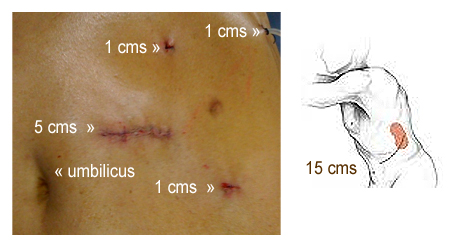Kidney Cancer account for 2 to 4%.
About Cancers
Cancer cells in tumors are abnormal and divide without control or order. These cancer cells can invade and destroy the tissues around them. Also, cancer cells can break away from a malignant tumor and enter the bloodstream or the lymphatic system. This process is the way cancer spreads from the original (primary) tumor to form new tumors in other parts of the body.
Kidney Cancer
Renal is the Latin word for kidney. Renal cell cancer is the most common type of kidney cancer, and occurs more often in men than in women. Like all cancers, renal cell cancer begins small and grows larger over time. Although renal cell cancer usually grows as a single mass within the kidney, a kidney may contain more than one tumor, or tumors may be found in both kidneys at the same time. Some renal cell cancers are noticed only after they have become quite large, but most are found before they metastasize (spread) to other organs through the bloodstream or lymph vessels.
Symptoms of Kidney Cancer
Due to the deep location of the kidneys, there may not be any symptoms until the tumor has grown quite large. The most common symptom is blood in the urine (hematuria). Other symptoms of kidney cancer may include:
- A lump or mass in the kidney area
- Recurrent fever
- Rapid weight loss
- Lingering dull ache or pain in the side, abdomen or lower back
- Feeling fatigued or in poor health
Detection & Diagnosis
Small and early stage renal cell carcinomas are commonly diagnosed incidentally by routine ultrasound and CT scans done for other unrelated symptoms and health problems. Larger renal cell carcinomas usually present with symptoms. There are several tests used to detect and stage kidney cancer:
- Imaging studies
These are ultrasound, intravenous pyelogram (IVP), CT scan and MRI scan. CT of the kidneys involve injecting a dye into the blood streams during the scanning. Kidney cancer will enhance (or light up brilliantly) while other pathology like renal cyst will not enhance. This is the best imaging modality. These CT scan is used to stage the disease as well. In patients with poorly functioning kidney or has allergies to contrast (dye), MRI is done instead.
Treatment
Kidney cancers are not responsive to radiations or Chemotheraphy.
Nephrectomy
- Depending on extend of disease whole or part of kidney will be removed.
- It can be done by open operation or by laproscopic (key hole surgery) method
Laparoscopic Nephrectomy (Removal of the Kidney)
Comparing size of incision in open and laparoscopic nephrectomy
|
Note: At Apollo hospitals, Chennai, Dr. K. Ramesh does laparoscopic nephrectomy as firstline treatment for small tumors and non-functioning kidneys.
|
Partial Nephrectomy
Partial nephrectomy or nephron-sparing surgery(NSS) is an effective treatment for selected kidney cancers. The procedure can be laproscopic or open.
Laproscopic partial nephrectomy is one of the complex laproscopic procedures in urology. Recently
Dr.Ramesh has performed his first laproscopic partial nephrectomy at Apollo Hospitals,Chennai for 6cm renal tumor as renal preservation surgery.
Indications
- Tumours smaller than 4cm or benign lesions.
- Patients with tumour in both kidneys.
- Tumour in a single kidney.
- Unilateral tumour when other kidney has poor function.

Nephrectomy and Partial nephrectomy can also be performed using da vinci Robot. Robotic partial nephrectomy has advantage of
- Better tumor clearance
- Less blood loss
- Less complications like bleeding, urine leak
- Removing large tumor
- Tumor close to large blood vessels
Visit www.chennairoboticsurgery.com for further information.
Minimally Invasive treatment
Minimally Invasive treatment like
- RF ( Radiofrequency Ablation)
- Cryotherapy
- HIFU
Minimally invasive treatment is indicated in patient who are unfit for any major surgical procedures and elderly patients.
 Urologist in Chennai | Robotic Urologist in India | Chennai Urology
Urologist in Chennai | Robotic Urologist in India | Chennai Urology




